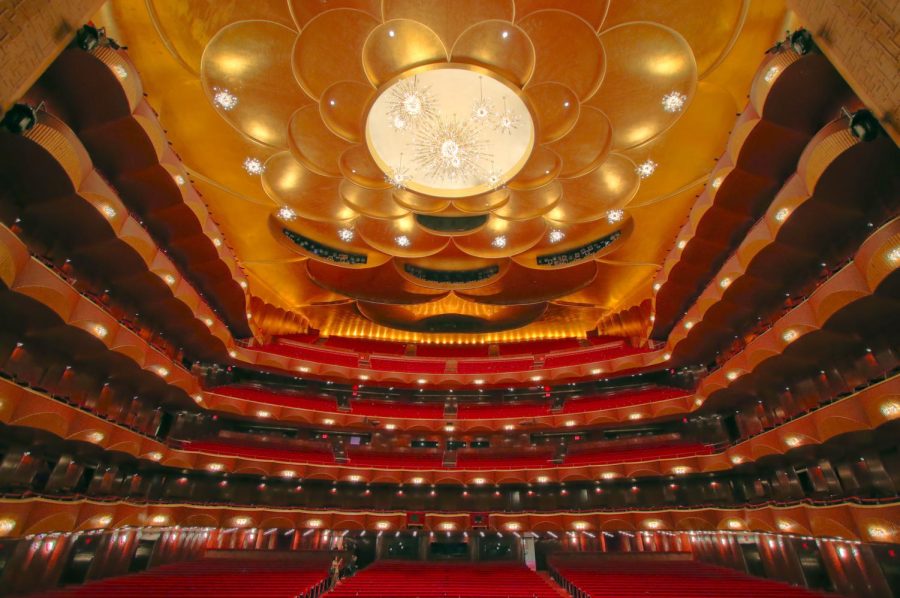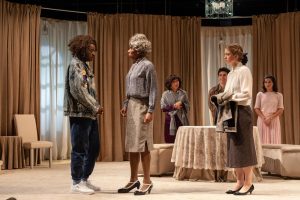The Haunting Mosaic of Theology, Dialogue and Sound in ‘Dialogues des Carmélites’
The Metropolitan Opera specialty is a searing meditation on faith, fear, freedom and female friendships
ALEX M FORTNEY VIA WIKIMEDIA COMMONS
The haunting bleak setting was reused from the first performance of “Dialogues des Carmélites” at The Metropolitan Opera house on February 5, 1977.
February 25, 2023
As the curtain rises at the Metropolitan Opera, the audience is greeted with an intriguing sight — a group of nuns lying face down on a tilted, cross-shaped, white stage. At the beginning and end of each of the three acts, the stage is set to this curious tableau. It makes all the difference when, in the final scene, the curtain falls to a painfully empty stage. No humans, no sets. Nothing remains of the heroines but their cross.
In December 2022, the theology and foreign language departments at Fordham College at Lincoln Center (FCLC) offered free tickets to attend the Met Opera’s production of Francis Poulenc’s “Dialogues des Carmélites” (which translates to “Dialogues of the Carmelite Nuns”). I, however, attended the production on January 28 through the Met Opera’s special student ticket service that offers prime seats to a majority of their productions for $37.50, instead of the normal price of approximately $200.
At first, I found it interesting that Fordham was so keen on getting students to watch this particular show, especially considering it is an opera performed entirely in French (with English subtitles). Upon viewing, however, it became clear to me that “Dialogues des Carmélites” is not just an educational experience but a profoundly moving work of art.
Music and theatrics are not just tacked on to make the story more palatable and exciting.
The story, based on an actual historical event, follows a nervous aristocrat named Blanche (Ailyn Pérez), who joins the convent to escape the brewing chaos of the French Revolution. She befriends a group of nuns who are different in disposition yet united in their deep faith. As the revolution spirals into the Reign of Terror, the Carmélites are gradually stripped of their right to perform their religious vows. They are forced to make a choice: submit to the new government or die.
This year’s production uses John Dexter’s famous 1977 staging. It is notably bare, with the aforementioned cross as the primary scenic device. This blankness allows the drama to focus solely on the large cast. Aside from Blanche, the ensemble boasts seven other major roles. Each character is impressively distinct and layered. Standouts in this particular performance included the despairing prioress Madame de Croissy (Alice Coote), the excitable Sister Constance (Sabine Devieilhe) and Blanche’s sentimental father (Laurent Naori).
True to its name, the dialogues on religion are the highlight of the opera. Any student interested in theology would find these conversations to be incredibly intriguing. They are far more than intellectual exercises or cheesy propaganda. The theological discourse uncovers the human fears and anxieties of women in the midst of political turmoil.
Though the nuns are unwavering in their commitment to their faith, human uncertainty echoes throughout the theater. No one arrives to save them from persecution. They are left to make their own decisions and, as a result, spend much of their time examining the mysterious logic of God. The opera does not shy away from how difficult it is to make the right choices and how stressful it can be to hold onto one’s convictions.
“Dialogues des Carmélites” also has much to offer outside the realm of faith. The story, after all, is based on history. Aside from questions on faith, burning ideals such as freedom and the dignity of life are dissected and reassessed. The dialogues also cover the dynamics of citizen and soldier, father and daughter, and brother and sister. These slowly unveil the slippery slope that leads people toward violence and indifference. From these interactions, we see that while God’s plans may be vague, man’s judgment can be blind. Here, the French language is given ample space to flourish as it explores key conflicts within history.
Beyond the divine, warm, beating heart of “Dialogues des Carmélites” is the unbreakable bond between the nuns. Throughout the numerous upheavals and periods of distress, the sisters rely on each other for support. They respect each other’s opinions and engage with their reflections. Their courage does not derive solely from God but from the fact that they see his love in each other. It is very refreshing to see a portrayal of sincere female friendships that are free from romance or petty drama.
The already-brilliant content of “Dialogues des Carmélites” begs the question: Why opera? One can easily see how the material could have easily been made into a movie or a play. However, I would argue that opera is the perfect art form to complement such a moving story. Operas tend to be highly dramatic, hyper emotional affairs. The genre prioritizes the music, putting much of its attention into maximizing expression. Poulenc crafts the score fully at the service of its narrative, using music to accentuate the story’s tragedy and pathos.
The dialogues, while fascinating texts on their own, can become labored. Poulenc’s music and Bertrand de Billy’s conducting breathes life into these long-winded discussions, encasing them in melodies as thoughtful as the text. Music and theatrics are not just tacked on to make the story more palatable and exciting. Motivations and internalizations are intelligently hinted at and developed through layers and layers of voice and orchestra. Subtleties that might be lost on stage such as a breath or a twitch are communicated through strategic pauses and note inflections.
Even silence serves a purpose. When so much of the performance revolves around words and sound, moments of silence weigh heavier with chilling tension. This is utilized to astounding effect in the opera’s haunting finale, a definite must-see that is considered to be among the greatest opera scenes of all time. Here, music is treated with its own syntax. The already-rich dialogues are elevated by language laminated on language.
Isabelle Guergolett, FCLC ’25, expressed appreciation for Fordham’s encouragement to view this opera. Upon watching it, she remarked on its power both emotionally and intellectually.
“This opera invites us to examine our own conceptions of terror and transformation, forcing us to confront what lies within the things we understand to be normative, but are not,” Guergolett said.
Though the final curtain has closed on this opera for the season, it is safe to say that this is far from its last run. “Dialogues des Carmélites” has been a favorite of the Met Opera since its premiere in 1977 and is typically revived every few years. Hopefully, Fordham will encourage students to immerse themselves in this unique experience when the opportunity arises again.














Sharon Gunderson • Apr 29, 2023 at 1:17 am
Fordham should tell its students to come
to the Bronx Opera production of this opera! at Lehman College May 6-7 and 13-14. exceptional singers and orchestra 🙂